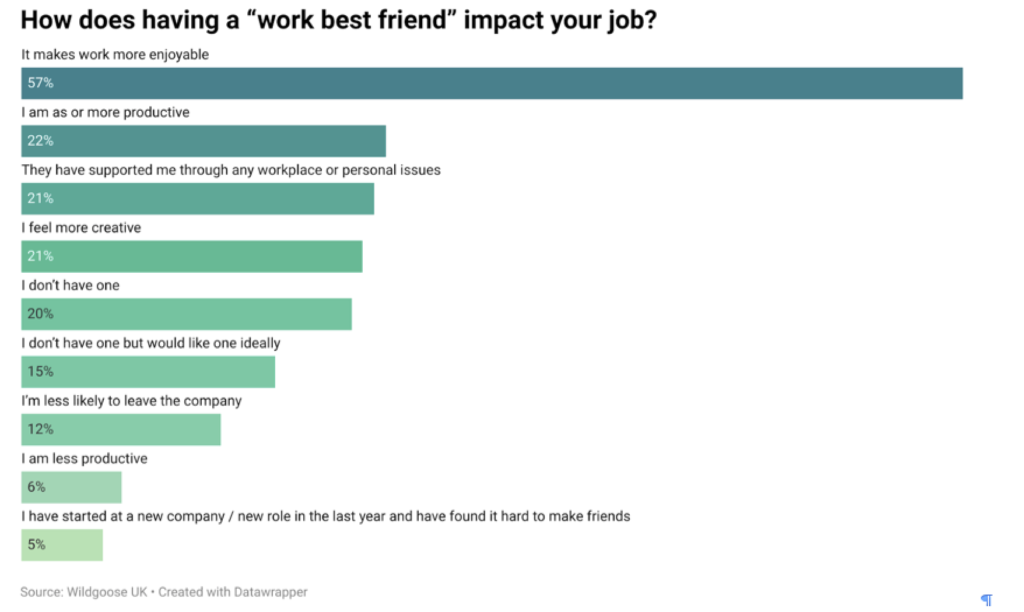New research has revealed that 40% of remote workers lack workplace friendships and are suffering from loneliness.
The 2021 Friends & Happiness in the Workplace Survey, conducted by team-building UK company Wildgoose, also found that 1 in 20 employees starting a new job while working from home have found it hard to make colleague friendships. This is equivalent to over 300,000 employees struggling to integrate and make friends in a new role. The study found that friendships at work are essential for both workplace and staff wellbeing to make day-to-day work more enjoyable, increase productivity and provide vital support networks.
WORKPLACE FRIENDSHIP BENEFITS
For those who have a ‘best friend’ at work, the research highlights clear benefits. Unsurprisingly, almost two-thirds (57%) of respondents say it makes work more enjoyable. Interestingly, 22% believe it means they are equally or more productive, and 21% say having a best friend at work makes them more creative. Additionally, 12% of people are less likely to leave a company where they have friends.
Workplace friendships play a particularly significant role in integrating young employees into a company. Almost one in three (29%) of those at executive level have needed support from colleagues, and almost one in five (19%) are more unlikely to leave a company where they have friends.

COST OF WORKPLACE LONELINESS
The survey findings come after a government ‘Employers and loneliness’ report, which highlights the cost of loneliness to UK employers – estimated to be £2.5 billion every year. For individuals, the cost of severe loneliness – due to reduced wellbeing, health and productivity – has been estimated at £9,900 per year, according to the Loneliness Monetisation Report conducted for the UK Department for Digital, Culture, Media & Sport.
Decision makers and HR teams are being encouraged to improve colleague connections as the country moves into a hybrid working model, with a mixture of people working from home and the office.
IMPROVING COLLEAGUE CONNECTIONS
So what can companies do to improve employee relationships? According to the study, many people clearly looking to form friendships at work and team-building efforts after a year of social isolation. Around 46% favour a monthly after-work drink; almost a third (30%) say they want a space to eat, socialise, and spend time with colleagues at work; and nearly a fifth (21%) favoured a team-building weekend away.
The survey also asked people if they would prefer in-person team activities or a virtual equivalent. In every case – whether the event was drinks, playing sport/gaming or a team-building weekend/activity – people chose the in-person option; further evidence of ‘virtual fatigue’ among the UK workforce, noted the study.

FACE-TO-FACE INTERACTION
As people around the country return to offices, organisations need to respond to the demand for more face-to-face interaction. “It’s only natural that people want to get out and socialise in person after lockdowns. I think we’ve all had enough of being indoors and people will be looking forward to seeing colleagues in person again. It’s a return to normality,” commented Wildgoose Managing Director Jonny Edser.
Some people have started jobs without meeting their new colleagues, “which must be especially tough,” highlighted Edser. “Hopefully those people can now get to know their new workmates properly. And companies need to realise that face-to-face social events play a huge role in that, particularly when people have lacked social interaction in their everyday lives.”
TACKLING LONELINESS AT WORK
“Don’t wait for signs of loneliness,” advised Gill Brabner, CEO at Resound Training. “Encourage managers to check in regularly with their team members and to take an active interest in their whole lives – know the individuals and what is important to them. Be friendly and warm. Demonstrate empathy and care. Encourage all employees to reconnect with their wider networks across the organisations – to talk to colleagues beyond their immediate team.”
The Covid-19 pandemic has put a spotlight on issues of loneliness and “this includes people in work who previously would have benefited from social time with colleagues”, explained Brabner. “This is exacerbated for those who live on their own. It’s also a difficult time to join a new organisation where the onboarding is 100% virtual. Online team drinks can be stressful occasions for newbies as many of the social cues are missing.”
HR should should focus on bringing the human elements in to work. “Set up, manage and facilitate online networking forums – when community forums are run well they can bring a great social element to work,” Brabner added. “Encourage leaders and managers to use video and show their human side, be vulnerable and let staff know they care. Don’t just build a business – build a community and a work family.”
For many employees, “what’s been missing is the chance to have fun with colleagues, rather than just focusing on work”, concluded Edser. “Our activities take people away from reality and let them focus on nothing other than having fun, outdoors, with workmates. We see it every day: getting employees together to do something completely different helps them to reconnect.”
Workplaces that integrate diversity and inclusion into recognition programmes, report higher levels of inclusion, engagement and financial success, confirmed a new study. Click here to read more.




































